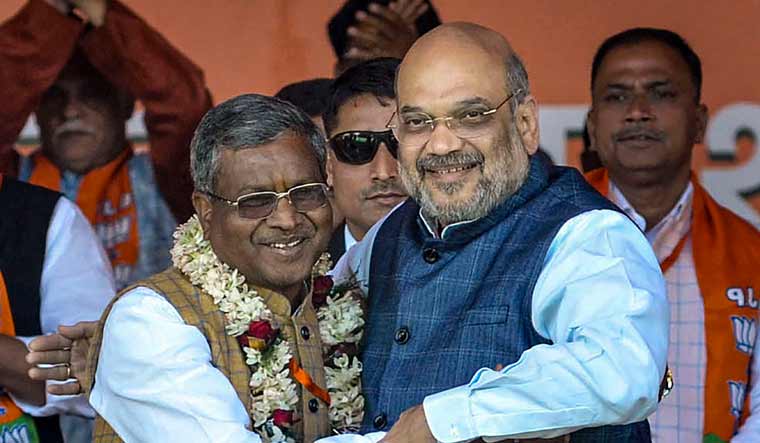Two months after it lost the assembly elections in Jharkhand, the BJP has started an exercise to strengthen the organisation in the state. Fourteen years after he left the saffron party to float his own outfit, veteran tribal leader and first chief minister of the state, Babulal Marandi, has returned to the BJP.
The BJP accorded a special welcome for 62-year-old Marandi as it organised a massive rally in the state capital for the merger of the Jharkhand Vikas Morcha (Prajatantrik) into the BJP. Home Minister Amit Shah flew to Ranchi to formally announce the merger of the JVM. “This will boost party’s strength manifold,” Shah said addressing the rally.
Marandi’s ghar wapsi is expected to strengthen BJP’s support base among the tribals. As the JMM-Congress alliance won the state elections, it took away majority of the tribal seats. As the BJP had experimented with installing a non-tribal chief minister Raghubar Das it felt a pushback from the dominant social group in the state, as it did in states like Haryana and Maharashtra where a CM was chosen from the non-dominant a caste group.
Marandi is a Santhal tribal, a community which state Chief Minister Hemant Soren belongs to. It is a dominant community in the state and also has significant presence in neighbouring Bihar, West Bengal, Odisha and even Assam. Among them, Bihar and West Bengal go to elections next year. Both these states have tribal dominated seats where the BJP may use Marandi.
What works in Marandi’s favour is that he has been associated with the RSS and the VHP before he ventured into electoral politics on a BJP ticket in 1990. He became the first CM of Jharkhand in 2000, but had to make way for Arjun Munda due to party politics, in 2003.
At the Milan Samaroh organised in Ranchi on Monday, he was seated next to Shah. It was clear how the pecking order will look like in the party's state unit in the coming days. Sources said key responsibility is likely to be given to him soon. BJP president J.P. Nadda, too, was expected to participate in the rally, but did not come.
“I am ready for any work that the party gives me,” Marandi said.
During the last assembly elections, Marandi’s party had won three seats. He announced support for JMM-Congress alliance, but withdrew it when two of his party MLAs moved to Congress camp. Earlier, in 2015 also, six of his MLAs had left the party to join the BJP. Even then, the BJP had asked him to merge his party with them, but he had declined.
Shah said he has been trying to get back Marandi into BJP for long but Marandi refused every time. “He left the party because of personal and organisational reasons. I was trying to get him back. He is very ziddi (stubborn). Now, after people’s nudge he has agreed.”
Shah highlighted the ideological decisions taken by the party during the second tenure including Article 370 and Ram Temple. “I want to tell the cadre that the aim of the BJP is not only to win elections. But also to carry forward national interests,” Shah said.
Interestingly, Shah didn’t talk about the CAA prompting many in the audience to wonder if it was a calculated move. However, Marandi spoke in favour of the CAA. “CAA is not a law to deny anyone citizenship but to give citizenship to persecuted minorities from neighbouring countries. We have to remove misunderstanding and fear from people,” Marandi said.
Marandi will be useful for the BJP in engaging with the tribals since the opposition has been alleging that the tribals are likely to be affected by the proposed NPR/NRC exercise as they may not be able to produce documents.
There was violence in Lohardaga when a pro-CAA rally was pelted with stones prompting the administration to clamp curfew.
Marandi said though he left the party in 2006, he was still around. “In these 14 years, I covered 6-7 lakh kilometers. I kept engaging with the people,” he said in the rally.
“People say it's because BJP lost that they called you. It's not true. Since 2006, there were efforts from within the party to return. In 2014, we were again asked, but we lost the state and Lok Sabha elections. Both Modi and Shah again called me to return. But I said 'what will people say since I lost',” Marandi said. He credited BJP vice president O.P. Mathur, who comes from the Sangh, for playing a key role in his return.
Marandi added, “Many people say that you have practised secular politics; I say India has been secular due to our cultural traditions and Hindutva. The BJP is a cadre based party. So, naturally, our likeness will be for an ideological party.”
The first test for Marandi will come in Dumka assembly by-election. The seat was vacated by CM Hemant Soren as he had contested form two seats.
Earlier, Marandi had defeated Hemant’s father and JMM founder Shibu Soren from Dumka Lok Sabha seat in 1998 and again won from 1999 thus emerging as a tribal leader from the BJP camp. This victory enhanced his status in the party and he was chosen in 2000 to become state’s first CM.



